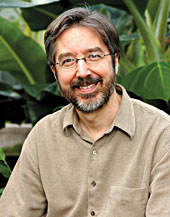 | Timothy Nelson |
Yale researchers are building a community atlas that provides the expression patterns of every gene in every cell type in rice -- one of the first cereals cultivated on Earth, and the principal food source for half of the world's population.
The four-year project is funded with a $4.5 million National Science Foundation (NSF) grant and is part of a $100 million NSF commitment to plant genome research.
"Rice has huge economic and cultural importance in the world," says Timothy Nelson, professor of molecular, cellular and developmental biology at Yale and principal investigator of the study. "Rice is closely related to other important cereal grasses, such as corn, rye, barley and wheat. It has a simpler genome, but it's close enough that much of what we learn in rice can be applied to these other species."
Nelson says the project combines his laboratory's interest in plant developmental biology with the emergence of specialized tools -- laser capture microdissection (LCM), whole-genome microarrrays, and bioinformatics computation, in particular -- that will enable researchers to analyze the expression of the entire rice genome of 50,000-60,000 genes with a cellular resolution.
Nelson and his colleagues, Xing-Wang Deng, professor of molecular, cellular and developmental biology, and Hongyu Zhao, associate professor of epidemiology and public health and genetics, will be collecting data for each of the several dozen cell types in rice under a variety of developmental and environmental conditions. They are currently collecting their first data sets and developing the informatics tools needed to analyze the enormous amounts of information they contain.
The open community nature of the project makes it possible for researchers and agricultural specialists around the world to access the resulting cellular gene expression information, and to contribute additional data to the atlas database.
The findings could potentially lead to everything from boosting crop size and quality to enabling scientists to conduct computerized experiments on virtual rice plants.
-- By Jacqueline Weaver
T H I S
Scientists win funding to collect
data on the rice genome
 W E E K ' S
W E E K ' S S T O R I E S
S T O R I E S![]()
 Yale delegates work to forge new collaborations in China
Yale delegates work to forge new collaborations in China![]()
![]()
 Applications are up in University's first 'early action' year
Applications are up in University's first 'early action' year![]()
![]()
 Voters are more influenced by political parties . . .
Voters are more influenced by political parties . . .![]()
![]()
 Dwight Hall launches fundraising campaign
Dwight Hall launches fundraising campaign![]()
![]()
 ENDOWED PROFESSORSHIPS
ENDOWED PROFESSORSHIPS Blight appointed Class of 1954 Professor of American History
Blight appointed Class of 1954 Professor of American History
![]()
 De Camilli named Eugene Higgins Professor of Cell Biology
De Camilli named Eugene Higgins Professor of Cell Biology
![]()
 Horwich is Higgins Professor of Cellular, Molecular Physiology
Horwich is Higgins Professor of Cellular, Molecular Physiology![]()
![]()
 Women astronauts tell how they realized dream of space travel
Women astronauts tell how they realized dream of space travel
![]()
![]()
 Event celebrates contributions of women scientists
Event celebrates contributions of women scientists
![]()
![]()
 Pfizer establishes fellowship in neuroscience to honor Goldman-Rakic
Pfizer establishes fellowship in neuroscience to honor Goldman-Rakic
![]()
![]()
 Faculty forum addresses issues affecting women in science, medicine
Faculty forum addresses issues affecting women in science, medicine
![]()
![]()
 YaleGlobal marks one-year anniversary
YaleGlobal marks one-year anniversary
![]()
![]()
 Reporter to discuss 'shock and awe' of covering White House
Reporter to discuss 'shock and awe' of covering White House
![]()
![]()
 Grant supports initiative to send doctors overseas
Grant supports initiative to send doctors overseas
![]()
![]()
 Scientists win funding to collect data on the rice genome
Scientists win funding to collect data on the rice genome
![]()
![]()
 Grant supports team's creation of robot to help diagnose autism
Grant supports team's creation of robot to help diagnose autism
![]()
![]()
 Yale selected as nation's first site for cancer epidemiology training . . .
Yale selected as nation's first site for cancer epidemiology training . . .
![]()
![]()
 Campus Notes
Campus Notes
![]()
Bulletin Home |
| Visiting on Campus
Visiting on Campus |
| Calendar of Events
Calendar of Events |
| In the News
In the News![]()
Bulletin Board |
| Classified Ads
Classified Ads |
| Search Archives
Search Archives |
| Deadlines
Deadlines![]()
Bulletin Staff |
| Public Affairs
Public Affairs |
| News Releases
News Releases |
| E-Mail Us
E-Mail Us |
| Yale Home
Yale Home